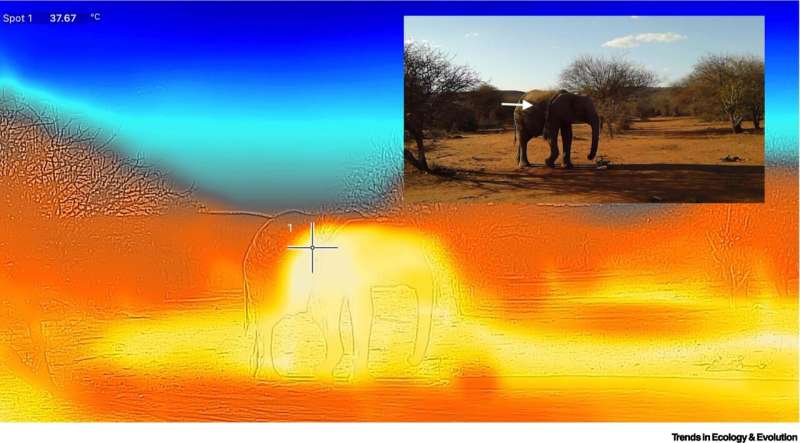This article has been reviewed according to Science X's editorial process and policies. Editors have highlighted the following attributes while ensuring the content's credibility:
fact-checked
peer-reviewed publication
proofread
Hot testicles may hold the secret to elephants' anti-cancer genes, suggests new study

A study published today in Trends in Ecology & Evolution unveils an intriguing connection between hot testicles and the evolution of potent anti-cancer genes in elephants.
Led by Professor Fritz Vollrath, Chairman of Save the Elephants, the research suggests that the absence of testicular descent in elephants may have driven the development of multiple anti-cancer genes, safeguarding their temperature-sensitive sperm production.
This novel hypothesis presents an exciting avenue for cancer researchers, potentially offering valuable insights into understanding the cellular response to DNA damage in humans.
Despite their large size and a higher number of somatic cell divisions, which traditionally increase cancer risk, elephants defy conventional expectations. This phenomenon, known as Peto's Paradox, was first observed by renowned Oxford epidemiologist Richard Peto, who noted that elephants and whales appear to be surprisingly resistant to the development of cancers.
Recent scientific advancements have shed light on the importance of elephants in deciphering this intriguing cancer mitigation puzzle. Key is the link between a genetic marker, the TP53 gene, and its protein product p53. P53 identifies and neutralizes damaged DNA during cell divisions and thus impedes the spread of mutations.
Remarkably, elephants stand out by hosting 20 copies of the TP53 gene, while all other known animals, including humans, possess only a single copy. This begs the question: Why have elephants evolved this seemingly magical defense mechanism against cancer when other species have not?
The study highlights that selection on somatic cells, which make up bodies, organs and tissues, is relatively weak and slow due to the intricate mix of healthy and potentially harmful cells. Additionally, evolution tends to proceed gradually when limited to developments occurring in older age, after most offspring have been produced. In contrast, selection on germ cells, such as sperm and eggs, is considerably stronger and faster, as it directly impacts the survival of each individual cell.
This brings us to the intriguing topic of testicle temperature. In mammals, the production of healthy sperm relies on the testes being several degrees cooler than the body temperature. Consequently, the descent of testicles into a scrotum plays a vital role in cooling them as maturity approaches. Elephants, however, lack the genes responsible for this descent, resulting in their testicles remaining inside their bodies even in mature bulls, subjecting them to elevated temperatures.
Considering elephants' inherent vulnerability to climatic challenges due to their bulk, unfavorable surface ratio, thick skin, and heat exchange mechanisms centered on blood flow in the ear flaps, their body temperatures can soar to levels that are detrimental to mammalian metabolism and detrimental to healthy sperm production.
Under the paradigm presented by this study, the proliferation of TP53 genes would not have primarily evolved to combat cancer but rather to support DNA stabilization in the spermatogonia, ensuring the production of robust spermatozoa and safeguarding the germ line. Nevertheless, this diversification of p53 proteins also offers protective benefits against DNA damage and mutations in somatic cell lines, thus providing additional collateral advantages linked to cancer and aging, an area where p53 is well known to play a prominent role.
Professor Vollrath, commenting on the research, says, "Elephants provide us with a unique system to study the evolution of a robust defense mechanism against DNA damage and explore the intricate details of the p53 complex in our own battle against cancer and ailments like aging. Novel insights in this field are always important, but especially now that overheating is becoming ever more of an issue also for us humans."
More information: Fritz Vollrath, Uncoupling elephant TP53 and cancer, Trends in Ecology & Evolution (2023). DOI: 10.1016/j.tree.2023.05.011
Journal information: Trends in Ecology & Evolution
Provided by Save the Elephants




















